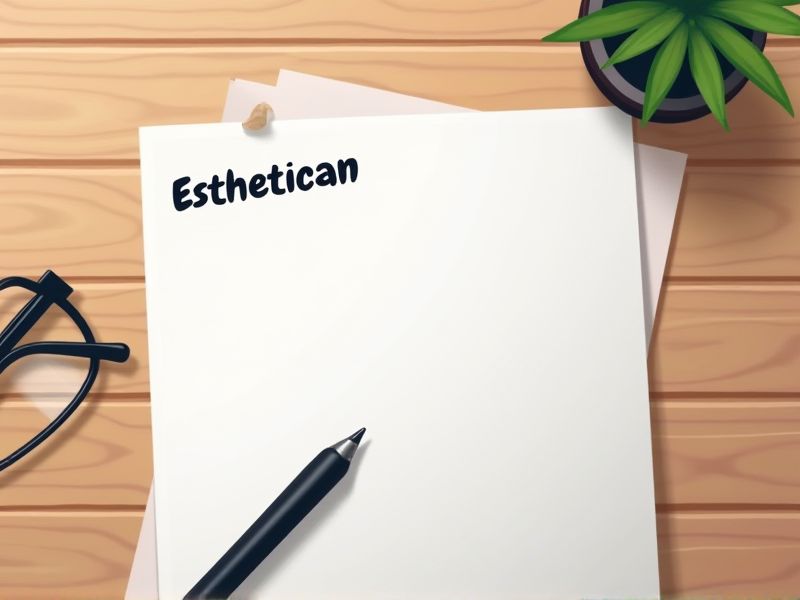
Becoming an esthetician requires a deep understanding of skin biology and various beauty treatments, necessitating specific certifications. These certifications ensure estheticians can safely perform procedures and use specialized equipment without causing harm to clients. Regulatory bodies mandate these certifications to maintain industry standards and protect public health. Here are some important certifications you may need as an esthetician.
State Esthetician License
A state esthetician license is necessary to ensure practitioners meet standardized education and training requirements, which helps maintain industry standards. It protects public safety by verifying that estheticians possess the necessary skill set to handle skin care treatments and products safely. The license is a regulatory mechanism to reduce the risk of skin damage or adverse reactions caused by unqualified individuals. It also enhances professional credibility, potentially increasing employment opportunities and client trust.
Advanced Facial Aesthetics Certification
The pursuit of an Advanced Facial Aesthetics Certification enables estheticians to master complex skincare treatments, directly enhancing client satisfaction and retention. By elevating their expertise, estheticians can effectively address diverse skin conditions, resulting in longer-term client relationships and career growth. Certification equips estheticians with compliance knowledge, which ensures treatments align with safety regulations and standards. With evolving beauty industry trends, having an advanced certification helps estheticians stay competitive, leading to increased client trust and business expansion.
Microdermabrasion Certification
Estheticians require a microdermabrasion certification to ensure they have the proper skills and knowledge to perform the procedure safely and effectively, reducing the risk of skin damage to clients. Certification demonstrates to potential clients and employers that the esthetician has met a specific standard of expertise in advanced skin treatment techniques. It can potentially increase job opportunities since some employers may prefer or mandate certified professionals for their services. With a certification, estheticians are better equipped to operate specialized equipment, following health and safety guidelines that are crucial for effective and safe practice.
Chemical Peel Certification
Estheticians require chemical peel certification to ensure they have the expertise to safely administer treatments and understand potential skin reactions. This certification verifies their proficiency in the latest techniques and products, which helps improve treatment efficacy. It also builds client trust, as clients are more likely to seek services from a certified professional. The certification often meets state or local regulations, enabling estheticians to legally offer chemical peel services.
Skin Analysis and Diagnostics Certification
A Skin Analysis and Diagnostics Certification equips an esthetician with advanced knowledge to accurately identify various skin conditions. Proper certification leads to enhanced client trust, as customers feel more confident in the expertise of certified estheticians. Accurate skin assessments allow estheticians to recommend effective treatments, which can improve client satisfaction and outcomes. Certification ensures estheticians stay updated with the latest industry standards and technological advancements in skincare diagnostics.
IPL Photofacial Certification
Estheticians seeking to offer IPL photofacial treatments need certification to ensure they are equipped with the necessary skills and knowledge to safely and effectively use intense pulsed light technology. Certification ensures compliance with industry regulations and reduces the risk of complications or legal issues arising from improper technique. It also enhances an esthetician's credibility and marketability, attracting clients who prioritize safety and expertise in their skincare treatments. The growing demand for non-invasive skin treatments amplifies the importance of certification to meet client expectations and industry standards.
Eyelash Extension Certification
Eyelash extension certification ensures estheticians understand safe and effective application techniques, reducing the risk of eye infections or allergic reactions for clients. It provides estheticians with in-depth knowledge of materials and tools, allowing them to offer high-quality services that attract and retain clients. Certification often acts as a testament to an esthetician's dedication to professional growth, enhancing their credibility in the beauty industry. Many salons and clients prefer or require certified professionals, potentially expanding job opportunities and client base for the esthetician.
Waxing Techniques Certification
Waxing techniques certification ensures estheticians understand proper methods to minimize client discomfort and prevent skin damage. Without certification, estheticians may lack knowledge of hygiene standards critical for avoiding infections. Clients often trust certified professionals more, leading to increased business and customer loyalty. Certification also allows estheticians to stay updated on new products and techniques, enhancing service quality.
Dermaplaning Certification
Estheticians often pursue dermaplaning certification as it equips them with specialized skills to safely and effectively remove dead skin cells and fine facial hair, enhancing client satisfaction. Certification ensures estheticians are knowledgeable about proper techniques and sanitation standards, which can reduce the risk of complications or infections during the procedure. Clients tend to seek certified professionals for dermaplaning services, driving increased demand and potentially higher income for those with certification. State regulations can mandate specific training credentials before offering advanced skin treatments like dermaplaning, reinforcing the importance of certification.
Spa and Wellness Management Certification
Spa and Wellness Management Certification equips estheticians with essential business and leadership skills, enabling them to manage spa operations effectively. Without this certification, estheticians may lack the knowledge to optimize client experience and satisfaction, impacting customer retention. The certification provides insights into health regulations and safety standards, reducing the risk of non-compliance penalties. Knowledge in financial management from the certification helps estheticians ensure the profitability and sustainability of spa services.
Summary
When you earn certifications as an esthetician, your credibility and expertise in skincare become more recognized in the industry. This recognition can lead to an increase in client trust and satisfaction, directly impacting your client base. The skills acquired from specialized certifications often enhance service quality, thus improving the overall client experience. Expect potential career advancements and higher earning potential as a consequence of your expanded professional skill set.
